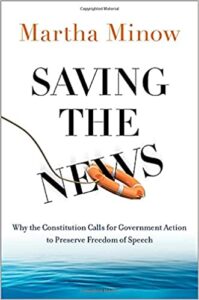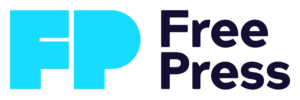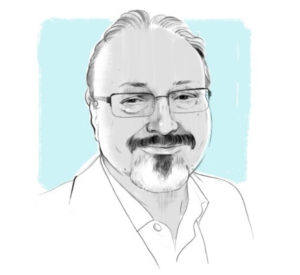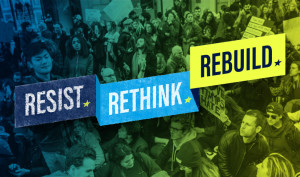1st Amendment
“The constitution is not a suicide pact.”
July 27, 2021“We can and must do more to regulate and support distribution of reliable news.”
CNN public editor: Why CNN’s audience deserves federally regulated news
by Ariana Pekary
Ariana Pekary is the CJR public editor for CNN. She was an award-winning public radio and MSNBC journalist for two decades. Now she focuses on the systemic flaws of commercial broadcast news. She can be contacted at publiceditors@cjr.org.
CNN, AS I’VE WRITTEN BEFORE, has amplified disinformation, relies on panel discussions that increase polarization, and has neglected voices of moderation for the sake of ratings. But is there some way to mitigate such problems, which are so common in cable news? Martha Minow, a professor at Harvard Law School, argues that the Constitution requires efforts to protect the free press––including regulation.
In Saving the News, Minow describes the merits of “deep and extensive government involvement in funding, shaping, and regulating media.” Some may balk at the notion of federal intervention in the news. But Minow chronicles how the government has granted newspapers low postal rates, invested in research that created the internet, established licensing protocols for broadcasters, and regulated telephone lines and features of digital platforms––involving itself in essential elements of the nation’s media infrastructure.
“If the ecosystem fails to provide necessary information to citizens,” she told me, “then democracy dies—and the Constitution is not a suicide pact.”
Minow argues that the First Amendment implies the existence of a functional press, so the government has an obligation to enact reforms and regulations to protect it. Many consider the industry to be a public utility, and therefore subject to regulation. And, as Minow explains in Saving the News, “Regulation of a necessary good or service also helps guard against coercion that works by exploiting people’s dependence, but it still permits private owners to operate for profit.”
The now-defunct Fairness Doctrine, which mandated journalistic balance by requiring broadcasters to air multiple viewpoints, is one example of successful oversight, Minow said. Supreme Court justices wrote in 1969 that it was a “protection for ‘the right of the viewers and listeners, not the right of the broadcasters.’ ” Public interest, Minow notes, is a vital characteristic of government intervention. Accordingly, we may deduce that the public has authority over an outlet like CNN to protect the audience.
The United States has a long, if forgotten, history of funding the news media.
In The Death and Life of American Journalism, Robert McChesney and John Nichols––cofounders of Free Press, a media reform group––calculated that “the level of government subsidy given to the American press in the 1840s was the equivalent of $30 billion in 2010 dollars.” But federal funding of public media amounted to just $465 million in 2020––an extraordinarily low amount compared with other countries.
Subsidizing public media, Minow told me, would “provide crucial competition and can stimulate for-profits to win viewers by doing better.” Sesame Street, for example, did not exist before broadcasters knew that the format would be popular. Now it’s competitive and profitable. We could use other public-private partnerships, similar to the current collaboration with ProPublica, to create new informative TV programs, she says, calling it a “public option” for journalism.
Other possibilities include tax incentives; for instance, if CNN adopted a certain set of ethical standards (see the Society of Professional Journalists’ as an example), then it could receive tax benefits for implementing procedures in the public interest. Minow said the government could also encourage measures to label news programming, to more clearly “distinguish news, analysis, and opinion.”
As a democratic nation, we may have lost sight of the need for an informed electorate. Commercial outlets dominate our media environment. But in Saving the News, Minow reminds us of our constitutional obligations. We can and must do more to regulate and support distribution of reliable news. CNN’s audience deserves it. All American audiences do.
The Society of Professional Journalists is the former Sigma Delta Chi, founded at DePauw University.
The right to say it, but…
May 14, 2020|
“In the U.S., the First Amendment certainly protects your right to speak. But there’s no absolute protection from the effects of what you say — particularly when those words may put a specific person in fear of injury or death.” — Gene Policinski, senior fellow for the First Amendment at the Freedom Forum, and president and chief operating officer of the Freedom Forum Institute |
“Humankind’s combined achievements are forming a global network of collective mind, a new intersubjectivity.
The noosphere is a new stage for the renewal of life and not a radical break with biological life. If there is no connection between oogenesis and biogenesis, according to Teilhard de Chardin, then the process of evolution has halted and (wo)man is an absurd and ‘erratic object in a disjointed world.’
?
Judith Hanson Lasater:
‘When we open to life, we are helping people we will never meet.
We make decisions every day, and they have an effect on the world. When we are present and make choices from this state of mind, the effect of what we choose creates ever-widening ripples that will help beings we may never meet. Be present as we make decisions.’
And the words we speak. The messages we share. Yes, we are given the right of free speech in this country, how are we using it? Ethical, moral speech…to do no harm.
-dayle
#Truth
October 6, 2019“Truth cannot be given the same level of coverage as falsehood. We shouldn’t make them equivalent. It’s not partisan for the media to be partisan towards the truth.”
-EJ Dionne, American journalist, political commentator, and long-time op-ed columnist for The Washington Post.
A message to the Fourth Estate: Don’t amplify the lies. Report truth.
Our voices were heard.
February 6, 2019Good news:
Yesterday [2.5.19], Facebook removed 22 pages connected to hateful conspiracy theorist Alex Jones and his fringe right-wing website InfoWars.
Thank you for signing our petition calling on Facebook to do just that.
This is a win for all of us working to end online hate-speech! Thank you for your help in making this happen.
In addition to our work to hold social-media platforms accountable for protecting users from online hate, we at Free Press are also working to hold mainstream media to a higher standard.
We need a free press. We also need a press that doesn’t replicate the racist and xenophobic stereotypes about communities of color and immigrants that make up the DT administration’s talking points. We need journalism that calls racism what it is, disavows White nationalism and empowers the voices of journalists and editors of color as well as the communities being reported on.
Thanks for all that you do.
The Free Press team
“Facebook Removes 22 More Pages Connected to Conspiracy Theorist Alex Jones and InfoWars,” CNN, Feb. 5, 2019.
https://act.freepress.net/go/30619?t=8&akid=12157%2E10632545%2E3Vvn2Z
Jamal Khashoggi.
October 18, 2018Reporters who knew Jamal speak of his energy for, and being energized by, writing freely in the United States. He was a full-time resident, living in Virginia. He is not defined as a radical, but as a believer in Freedom of the Press, and in Free Speech. Also, he had a vision to create an NPR (National Public Radio) like program, or platform in Saudi Arabia, and reportedly, had the investments needed to get it started.
The Washington Post, who Jamal reported for and who published his columns/articles in Arabic for the Arabic speaking world, published what is reportedly his final column, on Wednesday night, October 17th. Jamal filed the report with the Washington Post the day before he entered the Saudi Arabia consulate in Turkey.
In his words.
“My publication, The Post, has taken the initiative to translate many of my pieces and publish them in Arabic. For that, I am grateful. Arabs need to read in their own language so they can understand and discuss the various aspects and complications of democracy in the United States and the West. If an Egyptian reads an article exposing the actual cost of a construction project in Washington, then he or she would be able to better understand the implications of similar projects in his or her community.
The Arab world needs a modern version of the old transnational media so citizens can be informed about global events. More important, we need to provide a platform for Arab voices. We suffer from poverty, mismanagement and poor education. Through the creation of an independent international forum, isolated from the influence of nationalist governments spreading hate through propaganda, ordinary people in the Arab world would be able to address the structural problems their societies face.
The Arab world was ripe with hope during the spring of 2011. Journalists, academics and the general population were brimming with expectations of a bright and free Arab society within their respective countries. They expected to be emancipated from the hegemony of their governments and the consistent interventions and censorship of information. These expectations were quickly shattered; these societies either fell back to the old status quo or faced even harsher conditions than before.
[full collumn]
NPR/All Things Considered [10.18.18]
A tender and pointed reflection with NPR’s Mary Louise Kelly speaking with Fred Hiatt, editorial page editor from The Washington Post, about the publication of what seems to be Jamal Khashoggi’s final column and the Post’s effort to get to the bottom of Khashoggi’s disappearance.
https://wamu.org/…/the-washington-post-publishes-jamal…/
“Hollywood, Silicon Valley, presidential libraries and foundations, politically connected private equity groups, P.R. firms, think tanks, universities and Trump family enterprises are awash in Arab money. The Saudis satisfy American greed, deftly playing their role as dollar signs in robes”— Maureen Dowd/NYTimes
#freepress
December 11, 2016Free Press fights for your rights to connect and communicate.
We’re working to create a world where people have the information and opportunities they need to tell their own stories, hold leaders accountable, and participate in our democracy. We fight to save the free and open internet, curb runaway media consolidation, protect press freedom, and ensure diverse voices are represented in our media.
We believe that change happens when people have a real voice in the political process. To that end, we mobilize our growing base of 900,000 activists to sign petitions, meet with their elected officials, attend rallies and town-hall meetings, write letters to the editor, and take part in other targeted actions. We also craft policy proposals, conduct research, testify before Congress and argue in court for policies that serve the public interest.
The companies trying to kill Net Neutrality, crush competition and build media monopolies have way more money than we do. But we have two powerful things on our side: people … and a plan. Click here to join the movement.
Free Press is completely independent: We don’t take a single cent from business, government or political parties and rely on the generosity of individual donors and charitable foundations to fuel our work.
To learn more about our team, click here.
To learn more about our work, click here.
To donate, click here. (Thank you!)
Throughout our 13 years of existence, we’ve never faced a moment like this one.
With the grave threats to immigrants, people of color, Muslims, women, the LGBTQI community and others, we’re joining with our allies to counter the Trump administration and RESIST.
Now more than ever we need a free and open internet, journalism that holds politicians and corporations accountable and protection from unwarranted surveillance by government and law enforcement agencies.
With the Trump team already on the record attacking Net Neutrality, press freedom and privacy protections, we’ve got our work cut out for us.
But we promise you this: We will never — ever — stop fighting for your rights to connect and communicate.
Building and sustaining this level of opposition will require an immediate influx of cash to expand our lobbying, legal and organizing power. That’s where you come in: We can’t do it without your help.
We’re supported solely by gifts from individuals and charitable foundations. Unlike most groups, we don’t take a cent from business, government or political parties, so your contribution makes a big difference — and helps us stay independent.
We need to raise $100,000 by Dec. 31. We’re making good progress, and a generous donor will match all donations up to $16K to help us get closer to our goal. Donate today!






